Japanese zoo urged to reject elephants from Myanmar’s junta over propaganda value
- Myanmar’s junta has maintained links with Japanese government agencies and companies since its 2021 coup

Myint Swe, a labour union official who has lived in Japan for 20 years, was one of three Myanmar nationals who visited Fukuoka City Zoological and Botanical Gardens on June 25 to ask zoo officials to delay taking delivery of four elephants from Myanmar later this month.
The elephants are part of an exchange programme arranged by the State Administration Council, the official name for the military junta that seized power following a coup in February 2021, “to promote everlasting friendship between the council and Fukuoka City and Japan”.
In a statement provided to This Week in Asia, Myint Swe said: “We, Myanmese people in Japan, are shocked and outraged by this news.
“Since the military coup of 2021, serious human rights violations have been committed in Myanmar, including the military council’s repression of civilians’ rights and relentless air strikes against civilians.
“According to a civil society organisation, more than 5,200 people have been killed by the military council and 26,800 people have been wrongfully detained. In addition, the number of internally displaced persons has risen to more than 3 million due to the violent civil war.”